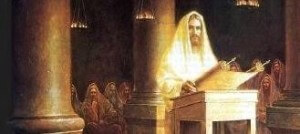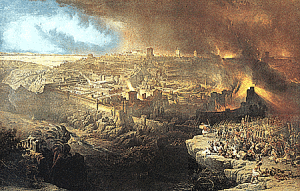The time before Advent is traditionally a time when we look forward, not yet to the coming of Christ, but to the end of days, the latter days, the time before the return of Christ.
Christ’s own teaching about this is only given at the very end of his ministry, and prompted by four disciples who want him to comment on the splendour of the temple.
A lot had happened in the few days preceding the so called “great eschatological discourse”. Jesus had experienced a triumphant entry into Jerusalem, he had cleansed the temple and he had taught in it. But in his last public discourse, Jesus did not exactly make friends.  He solemnly denounced the scribes and Pharisees for their pride and hypocrisy and for preventing people from entering the kingdom of heaven. He had even described their not so pleasant fate if they would not repent. All the righteous blood shed on the earth would come upon them, he said. They would not escape the judgement of hell. Finally, referring to a prophecy by Jeremiah, he had predicted “your house is left unto you desolate”.
He solemnly denounced the scribes and Pharisees for their pride and hypocrisy and for preventing people from entering the kingdom of heaven. He had even described their not so pleasant fate if they would not repent. All the righteous blood shed on the earth would come upon them, he said. They would not escape the judgement of hell. Finally, referring to a prophecy by Jeremiah, he had predicted “your house is left unto you desolate”.
The last thing that happened inside the temple, and which is important as background to our gospel text, was that Jesus observed a poor widow who put a few coins in the temple treasury. According to our Lord what she did was worth more than the gifts of most rich people. In the gospel of Luke this little story is at the start of chapter 21, and that in itself is significant, because the rest of the chapter unfolds upon the Mount of Olives. Apparently archbishop Stephen Langton, who divided the gospel into chapters in the 13th century, saw a connection between the story of the poor widow and the discourse on the time of the end. When we study both stories closely, we have to agree that they are linked. Clearly in both cases the moral is that riches and buildings do not count, but the intention of the giver is what matters, and the attitude of the worshipper.
 In the light of what Jesus had just taught and what he just said about the poor widow, it is even somewhat strange that the disciples were still focussed on the outward appearance and the riches of the temple. But maybe the disciples simply could not believe the way Jesus had given up the temple and its comforting rituals. Did he really think that the temple would once more be desolate? Maybe Christ should not be so negative and take another look from the outside. Were these temple buildings not awe-inspiring, pointing to God and uniting the nation?
In the light of what Jesus had just taught and what he just said about the poor widow, it is even somewhat strange that the disciples were still focussed on the outward appearance and the riches of the temple. But maybe the disciples simply could not believe the way Jesus had given up the temple and its comforting rituals. Did he really think that the temple would once more be desolate? Maybe Christ should not be so negative and take another look from the outside. Were these temple buildings not awe-inspiring, pointing to God and uniting the nation?
All three gospels have a version of the great eschatological discourse. Luke is the only writer who mentions both the precious stones and the votive offerings. From other sources we know that at the entrance of the temple there stood a large golden vine, donated by king Herod. You can just imagine the beauty of the intricate organic shapes of leaves and grapes and curly twigs. The temple itself was constructed of huge stones meant to last for all time.
 And here was Jesus saying that no stone would be left upon the other that would not be thrown down. By the way, this is not to be confused with Jesus’ saying that he would destroy the temple and build it again in three days. That saying is only found in the gospel of John, it was spoken to another audience and referred to Christ’s death and resurrection, as John himself explains. But here in Luke, he is talking about the actual temple, and this prophecy would come true in 70 AD when the temple was destroyed by the Romans as retaliation for the Jewish revolt. This detailed prediction also helped the Christian community to escape in time.
And here was Jesus saying that no stone would be left upon the other that would not be thrown down. By the way, this is not to be confused with Jesus’ saying that he would destroy the temple and build it again in three days. That saying is only found in the gospel of John, it was spoken to another audience and referred to Christ’s death and resurrection, as John himself explains. But here in Luke, he is talking about the actual temple, and this prophecy would come true in 70 AD when the temple was destroyed by the Romans as retaliation for the Jewish revolt. This detailed prediction also helped the Christian community to escape in time.
Now Jesus’ quarrel was never with the temple itself. Actually, he held the temple in high esteem. When teaching in the temple, he had declared that the temple sanctified the gold and that it was not the gold which sanctified the temple (Mt. 23:17). In turn, the temple itself was sanctified by the presence of God, as it had been with the tabernacle. But this was exactly where things had gone wrong.
The people of God had rejected Christ, who had come to His temple in the name of the Lord. In Matthew, Jesus not only declares that “their” house would be left desolate
– notice that it is no longer called Gods house –
but he also gives the reason why. “From now on you will not see me, until you shall say,
blessed is he that comes in the name of the Lord”. So in fact the desolation occurred as soon as Jesus decided to abandon the temple. This was also another confirmation of Christ’s divinity. When He leaves the temple to itself, it counts as God leaving the temple to itself.
This reminds us how important it is, that “our” churches should remain houses of God.
They should never be houses in which we take all the decisions, serving our own interests. They should never be houses where those with the greatest contributions matter most. They should always be preserved as houses of prayer to discern the will of God and serve Him. They were meant as places in which Christ is welcome, in whatever form he comes to us. For Christ said, “in so far as you have done something for the least of my brethren, you have done it for me.”
But the disciples, like many of us, also wanted to know what the future was holding. So Jesus warns them that many would try to lead them astray and that wars and earthquakes would occur, but not as a sign of the end. It is remarkable how, throughout time, many Christians have explained wars and natural disasters as signs of the end. The great tropical storm that hit the Philippines could be thought to be one of those signs. Environmental groups say that such extreme weather conditions are only possible because of global warming. That may be true, but Jesus clearly states in all 3 three gospels that natural disasters do not mark the end.
Then Jesus describes the persecutions his followers would have to endure.
Now it is interesting that Matthew places the persecutions or “tribulation” after the wars and famines and earthquakes. Mt. 24:9, “Then shall they deliver you up unto tribulation”.
But Luke says (verse 12), “Before all these things, they shall lay hands on you”.
I believe that both of these versions were spoken by Jesus and both are true.
We all know how Christians were persecuted by evil Roman emperors in the first centuries. Later on, many Christians persecuted each other, on account of real or presumed heresies. And today we can see the beginnings of a new kind of hatred against Christian minorities. This hatred no longer comes from Muslim-extremists only, with their attacks on churches. It now also comes from atheists, or rather anti-theists. An anti-theist is defined as one who: “Actively opposes a belief in gods of any sort and to institutions built around belief in a deity. They believe that religion is harmful to individuals and society and that it impedes scientific progress and encourages immoral acts.” The other day a priest was physically attacked by an anti-theist.
Christians and churches can no longer rely on their good name, even in the West. And it is true, that we have a lot to explain, but the contributions of Christianity tend to be forgotten.
Jesus said, “you will be hated by all men for my names sake”. And again, it is not quite sure to what time this refers, but it is not necessarily only the past.
In Matthew 24:37 Jesus compares the time before his return to the days of Noah. The masses will be ignorant of their own immorality and the impending judgement. It says they will be eating and drinking, marrying and giving in marriage, as if no injustice exists. The idea that all is well, is perhaps a better indicator of the end than the wars and earthquakes.
Paul, in his 1st letter to the Thessalonians, writes about the time of the end, “For when they are saying, “Peace and safety,” then sudden destruction will come on them, like birth pains on a pregnant woman; and they will in no way escape.”
When we consider all this, we can hardly believe that society will gradually or ever improve. What Christ seems to be saying is that things have to become worse before they get better. His own return will bring redemption and improvement, true justice and peace.
Not even the church can achieve this. All we can do is to remain steadfast and not be deceived. But that is not something trivial. That is why our Lord gave us three positive things to hold on to.
1. He said that the Holy Spirit would give us the words to defend ourselves. He even discouraged us to prepare our defence in advance, to compose complicated philosophies and apologetic texts. “The tree will be known by its fruits” and the rest will be taken care of.
2. Right after Jesus told the disciples that some of them will be put to death, he said “not a hair of your head shall perish”. This seems like a contradiction, but it is actually very comforting. It means that even if we suffer death, we will survive without losing out in any way.
3. Finally, after Jesus made the comparison with the days of Noah, he said, “Then shall two men be in the field; one is taken, and one is left. Two women shall be grinding at the mill; one is taken, and one is left”. I do not believe that this refers to some sort of secret rapture, with people suddenly disappearing all over the world, like in the film “Left Behind”.
Jesus chose the image of one who is taken and one who is left, to show that all professions, men and women, regardless of where they are, have equal opportunities before God. But we must act on them. In every group there are people who don’t. We need to read the signs of the times. We need to discover and do the work that Jesus has prepared for us to do.
Notice how Jesus does not say that only a minority will be saved. Christians who believe that often give up on the world, their mission becoming a monologue. Notice how Jesus also doesn’t say the majority will be saved. Christians who believe that often feel no need to be different, to oppose the popular culture. Most people will be saved anyway. In both cases their mission will fail, as mission requires engagement as well as conviction.
Christ never promised us gradually improving circumstances, but he did vow for us with his life, so that we might inherit the kingdom of heaven and eternal life. May we then be steadfast, assured of his love and walk in his ways, expecting his coming in glory.
Amen.





Leave A Comment